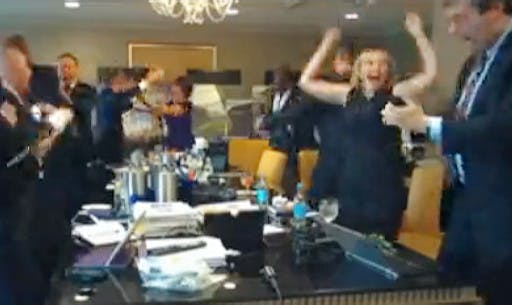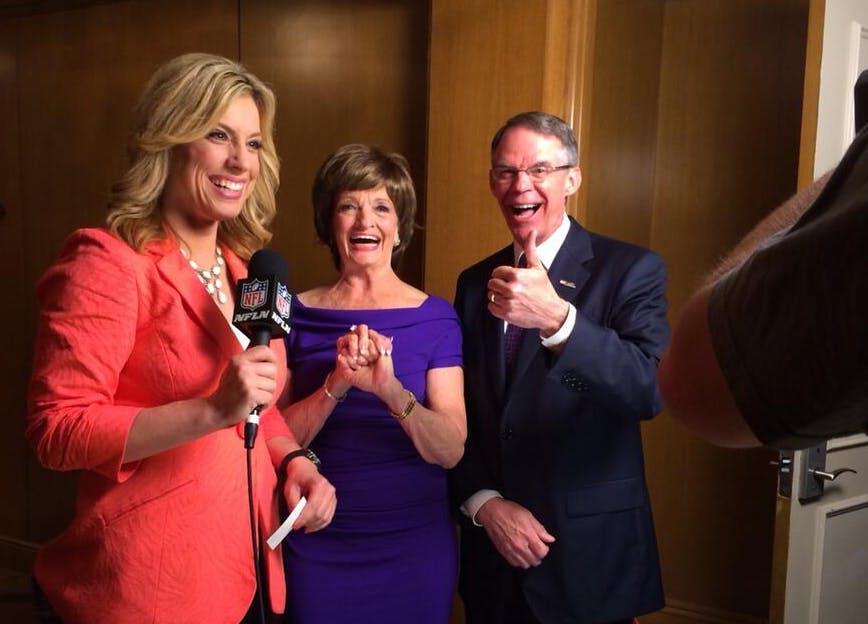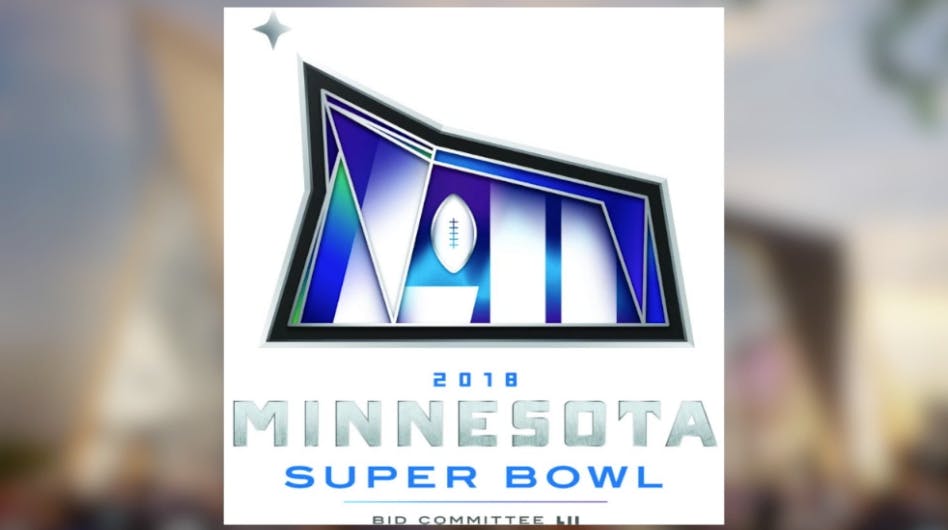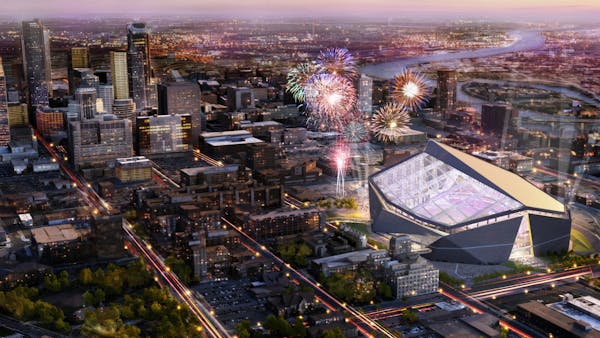ATLANTA – Four ballots into a tension-filled process, the Minneapolis Super Bowl pitch built around the new Vikings stadium triumphed Tuesday over party magnet New Orleans and 2012 host Indianapolis to bring the NFL's premier event to Minnesota in 2018.
U.S. Bancorp CEO Richard Davis, former Carlson Cos. board chair Marilyn Carlson Nelson and other members of the Minnesota delegation danced, jumped up and down, hugged and high-fived on hearing the news. Their raucous cheers and exclamations of "We did it!" reverberated through the hallways of the Ritz-Carlton Hotel in the upscale Buckhead neighborhood, where the high-stakes drama had just played out.
"The way they jumped for joy was the way I felt inside," Vikings owner Zygi Wilf said later at a news conference.
The theme of Minneapolis' bid, "Built for the Bold," which emphasized the $1 billion Vikings stadium under construction and the state's friendly ethos, was seen by some observers as an underdog to New Orleans. But after NFL Commissioner Roger Goodell announced the victor, a number of team owners said the new stadium was a decisive factor.
"We're going to make football fans everywhere proud," Vikings owner/president Mark Wilf said.
Minnesota last hosted a Super Bowl in 1992 in the recently demolished Metrodome. The big game is coveted by league cities because it brings with it two weeks of international media attention, millions of dollars of consumer spending and an incalculable civic boost.
Mark Wilf, who gave Minneapolis' five-minute closing argument to the owners during their closed-door meeting before voting, said he emphasized the public-private partnership involved in building the stadium. He also told the owners that the Super Bowl would validate the stadium as a top-notch facility for generations of Minnesotans.
Bringing the Super Bowl to Minneapolis is a coup for the Wilfs, New Jersey businessmen who have owned the team for a decade but are still considered outsiders by some Minnesotans. They lobbied furiously for a new stadium until the Legislature relented in 2012.
"I think that's what swayed most of the owners," said New York Giants owner John Mara of the new Vikings stadium.
The vote is secret, so the final tally won't be made public. But it clearly wasn't a slam-dunk for Minnesota. No team received the required super-majority on the first, second or third ballots. Indianapolis was dropped after the second ballot for having the least votes. The final ballot required only a simple majority of votes, and that pushed Minnesota to the top.
Members of the state's delegation beamed as they walked into a media room for a news conference to talk about the victory. With Carlson Nelson sporting a glamorous bright purple dress and Davis a purple tie, the Minneapolis team had strutted through the Ritz-Carlton lobby to the NFL owners' meeting room with more pizazz and seemingly more purpose than the dark-suited teams from the other cities.
Still, there were some last-minute jitters.
To prepare for their presentation, Carlson Nelson and Davis sat at the head of the table in the Minneapolis war room. She admitted to being nervous. He smiled. Someone among the other members of the delegation — Vikings vice president Lester Bagley, Melvin Tennant of Meet Minneapolis, Michael Langley of Greater MSP, and Michele Kelm-Helgen, executive director of the Minnesota Sports Facilities Authority — played Queen's anthem, "We Are the Champions," on their phone as everyone sang along, danced and held hands.
They came out of their 15-minute presentation satisfied they'd left nothing unsaid. Davis playfully mugged before the interview for the cameras, saying, "What up, Minnesota?" Carlson Nelson got misty-eyed as she spoke of her pride in the quality of the presentation and her hometown. "If only you knew these people," she said she wanted to tell the owners. "They're so authentic. They're so real."
The pride and preparation paid off. In a television interview after the victory, an ebullient Carlson Nelson said, "Tell everybody to come!"
What Minnesota pitched
Before the presentation, Minnesota's steering committee members kept their cards hidden, but afterward they revealed the bid's theme and emphasis on the ease of navigating the Twin Cities and plans to make the Mall of America a hub of action.
They also told the owners that the St. Paul Winter Carnival has agreed to build an eight-story ice castle — its first since 2004. And that the Minneapolis-St. Paul International Airport is bigger than the airports serving the other bidders. And that light-rail transit will make ground travel easy.
Davis told the owners that the Mall of America, which will be doubled in size and offer four new hotels by 2018, would be home to marquee Super Bowl events. "It's a place no one else has," he said.
Other details emerged after the vote: The committee committed to bringing in Mayo Clinic physicians to work with youths on sports safety and nutrition as part of the philanthropic legacy of the 2018 game, Carlson Nelson said.
All members of the bid committee plan to stay on as the focus moves to planning.
"We have 3½ years, but we're going to act like it's starting tomorrow," Davis said. Billboards heralding the game and featuring the new stadium were unveiled in the Twin Cities not long after the news was announced.
As soon as 2017's Super Bowl is over in Houston, a Minnesota CEO will be paired with an NFL owner to begin work on the yearlong lead-up and volunteer recruiting will begin, Carlson Nelson said.
New stadium captured votes
In their comments after the vote, NFL owners and Goodell all singled out the new stadium, which is set to open for the Vikings' 2016 season.
"That won the day," Philadelphia Eagles owner Jeffrey Lurie said. "The public really stepped up and supported in a major way a state-of-the-art stadium."
Jacksonville Jaguars owner Shad Khan said the same, adding that awarding a Super Bowl to a city with a new stadium is "a great NFL tradition."
Goodell called the stadium the "distinguishing factor" in the Minneapolis bid.
New York Jets owner Woody Johnson said, "The thing that stood out to me was the commitment the people of Minnesota gave to the Vikings. The owners responded to that."
Oakland Raiders owner Mark Davis is trying to get public help for a new stadium. "It's an important message for those in the Bay Area — if you can get something done, you will be recognized for it," he said.
Levi's Stadium, new home to the San Francisco 49ers, will host the 2016 Super Bowl — two years after opening this fall.
At the end of his news conference, Goodell was still talking stadiums — this time about the need for one in Buffalo.
"You need to have the kind of facility that people want to come to," he said.
Rochelle Olson • 612-673-1747

Baseball Metro Player of the Year packs up his five tools and leaves

Prep baseball 2024: 35 Minnesota stars who the recruiters covet
Police searching for St. Paul home intruder who raped, robbed woman

Friend heard money, relationship woes from man tied to Chanhassen killing who took his own life




